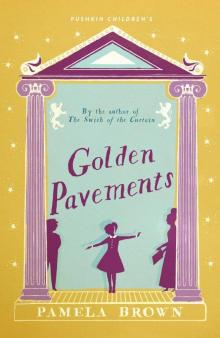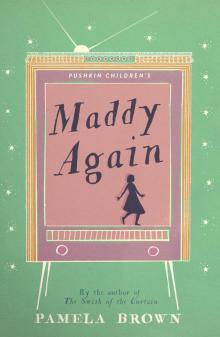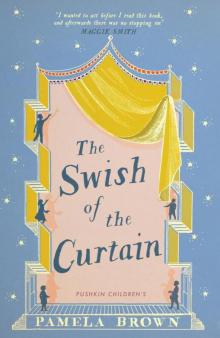- Home
- Pamela Brown
Blue Door Venture Page 4
Blue Door Venture Read online
Page 4
‘Well,’ said Maddy, ‘we could do with a bit of luck round here, so you can stay and help me if you like, but I can’t go off and leave you here alone. The others would kill me.’
‘Who’s the boss here, anyway?’
‘Nigel, I suppose. He’s the eldest.’
‘H’m. How old is he?’
‘About your age.’
‘Bunch of kids. Need someone with some experience.’
‘Well, we’ve got Mr Chubb who usually does the box-office but he’s about seventy, and he’s got bronchitis.’
‘Old buffers are no good. You want someone young—with ideas… publicity, that’s what you need—’
‘That’s what I think,’ agreed Maddy earnestly, and they spent the rest of their morning with their heads together, discussing outrageous publicity stunts, ranging from parades through the town on an elephant to having Maddy mysteriously kidnapped.
When the others appeared at the end of the rehearsal they stared, amazed, at Maddy’s new friend.
‘Well,’ breathed Sandra, ‘Maddy certainly does pick them.’
‘I’m Lucky,’ he announced, holding out his hand to Nigel. ‘You’re the boss, I can see that. Nice place you’ve got here. I been giving your little sister a hand.’
‘She’s not my little sister,’ Nigel said rather shortly, ‘and I don’t really think she needs any help.’
Maddy began to feel a bit guilty. She could see that they were all suspicious of Lucky, and that once more her knack of making friends with strangers was being frowned upon.
‘Nigel,’ she said, ‘Lucky has just sold twenty four-and-sixpennies for Boxing Day. Some sort of outing, isn’t it?’
‘Girls Friendly Society or something,’ said Lucky.
‘They wanted to take three-shilling ones, but Lucky made them take four-and-sixpennies—’
‘That was a very good effort, but I’m sure I don’t know why you should trouble yourself on our behalf,’ said Nigel, too politely.
Lucky laid a confidential hand on Nigel’s shoulder. ‘Now look, chum,’ he said, ‘I’m only trying to help you. I think you’ve done a smashing job of work over this place—but you can’t attend to everything yourself, now can you? I know this racket, mind, been in it myself, and I know it’s pretty tough. What you need is someone to look after the business side for you. Someone with push—and experience.’
‘We have a business manager, thank you,’ said Nigel coldly. ‘He’s ill at the moment, but will be back in a few weeks.’
Lucky spread his hands. ‘Then what’s wrong with me taking over temporarily, say?’
Nigel looked at him hard, then, catching the doubting glances from the others, and a warning dig in the ribs from Lyn, said, ‘No, I’m sorry. We couldn’t possibly take you on without references and testimonials and things, and by the time all those were taken up, Mr Chubb would be back again.’
‘O.K.—O.K.…’ Lucky shrugged his shoulders, smiling and unruffled, ‘I can get better jobs elsewhere.’
As he turned to go Nigel said casually, ‘Of course, if you’re going to be around over Christmas, you can drop in and help Maddy or whoever is in the box-office—just to pass the time. But we can’t pay you anything.’
‘I’ll think about it,’ he sang out, hitching the padding in his shoulders into position as he swaggered out into the street.
When he had gone, ‘Maddy!’ they cried.
‘That awful boy!’ said Sandra. ‘Fancy letting him into the box-office! You’re not safe to be left alone for five minutes.’
‘I didn’t let him in,’ said Maddy in injured tones, ‘he just came in.’
‘What a nerve!’
‘But you must admit he did a nice piece of work with the Girls Friendly Society or whatever it was.’
‘Yes,’ said Nigel doubtfully. ‘It’s more than any of us would have done—or Mr Chubb, come to that. If Mr Chubb thinks people really want to see the show, and can’t afford the expensive seats that are left, he’s inclined to let them in free to stand at the back. I’ve caught him at it.’
Lyn said, ‘Of course, that awful type was quite right. We do want someone young, with some push—we’re all too busy, and Mr Chubb is too nice—’
‘But not that boy,’ said Sandra. ‘Not with that suit, and that hideous tie.’
‘Snob,’ said Maddy. ‘You don’t look so hot this morning, yourself.’
Sandra surveyed herself in the long mirror in the foyer. Certainly in her faded blue slacks and old school mackintosh, with her hair tied up in a scarf, she didn’t present as smart an appearance as Lucky. She sighed. ‘Granted. Oh, I expect he meant well. But let’s hope he won’t turn up again.’
That evening Lucky bought a seat in the front row of the stalls that someone had returned at the last minute. He led the applause at the end of every number, and joined loudly in the choruses. From the stage the Blue Doors could see his shining hair and laughing beady eyes. They raised their eyebrows, but they had to admit that he made the audience even more responsive than usual.
Next morning he was waiting outside the theatre, and helped Nigel and Bulldog take down the new shutters, unlock the box-office and hang out the photos of the show and the artistes.
‘A smashing little panto you’ve got,’ he told them. ‘Nothing spectacular, but it’s got what it takes. Topical and—intimate, I’d call it. That’s what I’d call it—intimate. And that Maddy’s a caution. And that comedy ballet dancing.’
‘We’ve got some real ballet dancers in the show tonight. Some little kids,’ Nigel told him. ‘Their licences only came through today.’
‘That’ll be a draw,’ observed Lucky. ‘All the old ladies love a few nippers in the show to coo over.’ He followed them into the box-office and answered the phone several times, and began persuading people who rang up vainly trying to book for the pantomime, to take tickets for the following show. ‘It’s another grand Christmas presentation,’ he told them suavely. Bulldog and Nigel rocked with silent laughter. When he had put the phone down he turned to them. ‘Why, what’s wrong with that?’ he inquired innocently.
‘We’re doing Granite,’ they roared.
‘Oh. Isn’t that a Christmas show?’
‘Er—no. Not really.’
‘Then you’re crackers. Why not cash in on the Christmas racket? You ought to run that panto a few more weeks. You could have booked it up twice over already.’
Nigel and Bulldog looked at each other. It was an idea. It was straying from their usual repertory system of a different show every fortnight, but it would save them a lot of work, and give them more time in which to rehearse Granite. Nigel thought quickly, then said, ‘Look, Lucky, run round to the printers, will you, it’s in the High Street, Bramwell’s, opposite the Town Hall, and ask them to print some slips to go over the posters saying, “Retained for another fortnight by popular request”.’
‘O.K., Chief!’ and Lucky was off like a shot.
Nigel and Bulldog looked at each other and grinned sheepishly. ‘He’s not really a bad chap,’ said Nigel casually.
For the rest of the morning while the others rehearsed Granite, and Maddy looked after the box-office, Lucky was dashing about on errands continually, to the newspaper office with announcements of the retaining of the pantomime, to the Town Hall for final arrangements about licences, to the post office for stamps—in fact, all the little errands that took up so much valuable time in the running of the theatre. By the end of the day they were wondering how they had ever done without him.
That evening he said to Nigel, ‘What do you do about the box-office during the show?’
‘We have to close it now that Mr Chubb is away and we’re all busy on stage.’
‘That’s a wicked shame. Wicked. All the people who work during the day don’t have a chance to book. And you’ve got another two weeks of panto to book now.’
‘O.K.,’ said Nigel. ‘You take over. You know how it works already, don’t you?’
&
nbsp; ‘Leave it to me,’ said Lucky, ‘I’ve worked a box-office before now.’ He slapped Nigel on the back, and then, answering the phone, sold the two worst seats in the house to Miss Thropple. They were almost behind a pillar, and most people had learned to fight shy of them. Nigel shook his head in amused wonderment, and went back-stage to change into his bearskin.
From that moment, Lucky took over. He worked like a slave in the box-office, keeping it open from early morning until after the show at night. He got Billy to fetch his meals on a tray from the café, and refused to leave his post for anything. Within a couple of days he had booked up the two remaining pantomime weeks, and was trying to persuade Nigel to run it twice nightly.
‘No,’ said Nigel. ‘It would be too hard on the artistes, especially the kids.’
‘But think of the dough you’d rake in.’
Nigel said slowly, ‘But we’re not doing this for money, you know.’
Lucky laughed cynically. ‘Not in it for money! That’s a good one! But even if you weren’t—you’ve got debts, haven’t you? To the Town Council or something?’
‘That’s right,’ said Nigel. ‘We do want to get that loan paid off.’
Eventually Lucky persuaded him to put on some extra matinées, to encourage parents to bring small children.
Christmas passed in a whirl of work. They did two shows on Christmas Eve, and two on Boxing Day, and on Christmas Day did excerpts from the show at a neighbouring orphanage. Lucky highly disapproved of this.
‘Throwing yourselves away,’ he commented. ‘Why, they might have brought the whole orphanage to the theatre, if you hadn’t been so darned charitable.’
He was so jealous for the financial side of the theatre, that the others found it hard to understand.
‘It’s not even as if he’s getting anything out of it himself,’ observed Nigel.
After a while, Nigel felt that he must pay him a small wage for all his hard work, and this Lucky accepted with an airy, ‘Thanks, boss. But you needn’t’ve bothered. I got my own income y’know.’
Mr Chubb, still in bed with flannel round his throat, gloated over the accounts. ‘By the end of the panto, old laddy, we’ll be square—paid off—able to look the world in the face…’ he told Nigel. ‘I’m so glad. But sorry not to be on the spot while things are so promising.’
Nigel had not told him how much of it was due to Lucky’s enterprise, but had merely said that they were managing between them in his absence with the help of a young boy who had turned up.
‘Now that we shall have paid off our debt to the Council we can start spending a bit on the shows.’ Nigel and Mr Chubb went off into a long pipe dream about new sets and hired costumes and guest artistes down from London, until they were interrupted by Mr Chubb’s landlady bringing him his medicine.
As Nigel left, Mr Chubb said, ‘Well, dear boy, I shall be back in harness shortly, so keep things humming, won’t you?’
Nigel promised he would, mentally adding, ‘Or rather, Lucky will,’ and left the old man to his cough mixture and back numbers of The Stage.
That night in the boys’ dressing-room Nigel said, ‘I think we ought to throw a party on the stage on the last night of the pantomime.’
‘Oh, yes.’ they all agreed. ‘Whom shall we invite?’ The list grew steadily longer. Their parents, the Town Council, the Bishop, several of the local shopkeepers who lent them properties…
‘But the guest of honour,’ said Bulldog, ‘will most certainly be friend Lucky.’
‘But what worries me,’ said Nigel, ‘is what to do with him when Mr Chubb comes back.’
That, indeed, was a problem.
5
A SENSE OF BUSINESS
‘I shall be quite sorry when the pantomime is over,’ said Lynette, as she made up in the girls’ dressing-room. ‘It’s been such fun.’ Snooks and the other fairies agreed whole-heartedly.
‘I wish we hadn’t got to go home,’ said Snooks, half in and half out of her ballet frock. ‘Couldn’t we stay on until it’s time to go back to the Academy?’
‘I’m afraid not,’ said Lyn. ‘Besides, your mothers will want to see a bit of you during the holidays, won’t they?’
‘Only two more nights of Goldilocks,’ observed Maddy.
‘Ouch!’ for Sandra was combing out her pigtails and twisting them into ringlets. ‘Then I’ll be more noises off in Granite, then back to London—oh, dear—’
‘Isn’t it a relief,’ said Vicky, ‘now that we’re doing good business. It was such a worry before Christmas when everything was so dreadful. Now it seems just like when we were doing odd shows for fun.’
‘“Odd” was the word. Do you remember some of the extraordinary plays we did that we wrote ourselves? Why, we all but made them up as we went along…’
Until ‘Beginners, please’ was called, they amused the new additions to the company with stories of their amateur days.
The party on the closing night of the pantomime was to be an imposing affair. Nigel announced that the company was to wear evening dress, and the catering was being done by Bonner’s, the best restaurant in the town. ‘After all,’ they kept saying, ‘we can afford to splash out a bit now.’
The pantomime became a bit rowdy and farcical, and there were a lot of new lines put in on the last night, and the whole cast were inclined to be giggly, but the audience, a lot of whom were seeing it for the second time, were sympathetically disposed and joined in the fun. The three bears even went down into the audience and gave the children rides. They took six curtains afterwards, and then began frantic preparations for the party.
Trestle tables were laid out on the stage, and loaded with luscious eatables by the four helpers from Bonner’s, and the tip-up seats were moved in long rows from the centre of the room to the sides by the whole company, still in their costumes. Then they hurried to change into evening dress and to modify the brightness of their stage make-up. Hardly had they done so, when the guests began to arrive. At the door the company greeted them smilingly, and led them to the buffet.
‘This will do us a lot of good in the town,’ murmured Lyn to Vicky. ‘Watch me being sweet to the Mayor…’ and approaching him she treated him to her sweetest smile, and a greeting of ‘How glad we are that you were able to come! And you must be such a busy man…’
Lucky, in a white double-breasted dinner jacket, was introduced to everyone as ‘our friend who has been helping us on the business side’, and he behaved beautifully. He didn’t slap anyone on the shoulder or affect his Brooklyn accent, and even had a long conversation with one of the Town Council on the subject of the theatre’s finances.
‘Now you’re a business man yourself,’ Jeremy overheard him saying, ‘and you know that in this racket, you’ve gotta have a sense of business…’
Maddy and the fairies were having a wonderful time. They had been told to keep on the clothes they wore in the show, as they were as good as party dresses, and they skipped about in their little short skirts, with everyone making a terrific fuss of them.
Nigel had a long talk with the Mayor, and assured him that they would now be able to repay the loan.
‘We could do it tonight,’ he said. ‘We’ve got all the takings for the pantomime locked up in the box-office, but perhaps we won’t mix business with pleasure.’
‘My dear young man, please don’t trouble yourself about it. There is absolutely no hurry. You will be repaying it long before we expected.’
‘I know,’ said Nigel. ‘But we want to, so that all the people on the Council who said that they’d never see the money back, will have to eat their words. By the way, how is Mrs Potter-Smith?’
‘Recovering, I believe,’ smiled the Mayor. ‘I’m afraid she’ll be up in time for the next Council meeting…’ They laughed ruefully.
About midnight, Nigel called for silence and said, ‘And now, ladies and gentlemen, we have a few little New Year gifts to present. The Lady Mayoress…’ and Snooks ran forward with a large bouquet, a
nd presented it with a careful curtsey.
‘And to those snow-flake fairies who have graced us with their presence for the last few weeks…’ Maddy, grinning broadly, presented to each of her six friends a celluloid doll dressed up in a white paper ballet skirt. On Buster’s she pencilled a beard and moustache, and everyone wondered why the smallest fairy was suddenly stricken with giggles.
‘And, lastly, to the gentleman who has brought us so much good fortune and really lives up to his name—Lucky, where are you?’ Maddy ran into the middle of the room with another celluloid doll dressed up in a gaudy tie, sitting in a cardboard box with a window cut in it to look like a box-office.
‘Lucky, where are you?’ shouted Nigel again, but he did not appear. ‘Give it to him later, Maddy,’ he said. ‘Carry on, everyone. It isn’t nearly bedtime yet.’
Jeremy sat down at the piano and began to play old and new tunes, and soon everyone was grouped round the piano singing.
It was easy for Nigel to slip away from them unobserved and go to the telephone back-stage. He rang the digs where Lucky stayed and spoke to the landlady. ‘I’m a bit worried about Lucky,’ he said. ‘He seems to have left the party early. I hope he’s not ill.’
‘Oh, he’s not here, Mr Halford,’ was the reply. ‘Said he was going away for the week-end, but would be back on Monday. I hope he will, I’m sure; he hasn’t paid his rent this week, and I see he’s took most of his luggage with him.’
‘I see. Thank you. I didn’t know he was going away this weekend. Sorry to have troubled you at this late hour.’ Nigel rejoined the party who were singing ‘Begone, Dull Care’.
It was getting on for one o’clock when the guests began to depart. The fairies were all blinking and rubbing their eyes, and Maddy was unashamedly asleep in a chair, with a half-eaten bun clutched in one hand. The caterer’s assistants had departed with promises to come in and put things to rights on Monday, and the Town Councillors were ringing up for taxis to take them home.

 Golden Pavements
Golden Pavements Maddy Again
Maddy Again The Swish of the Curtain (Blue Door Book 1)
The Swish of the Curtain (Blue Door Book 1) Blue Door Venture
Blue Door Venture The Swish of the Curtain
The Swish of the Curtain